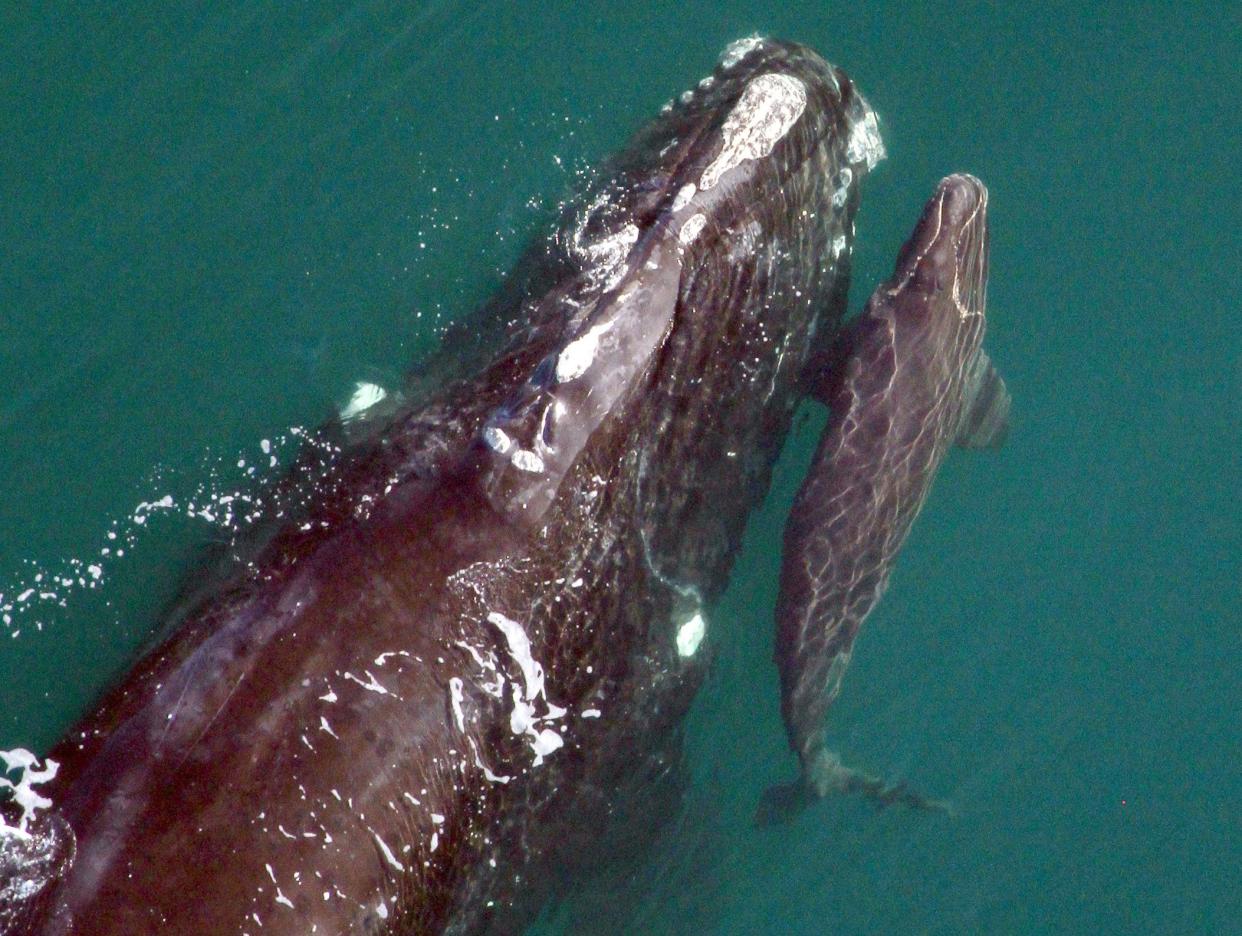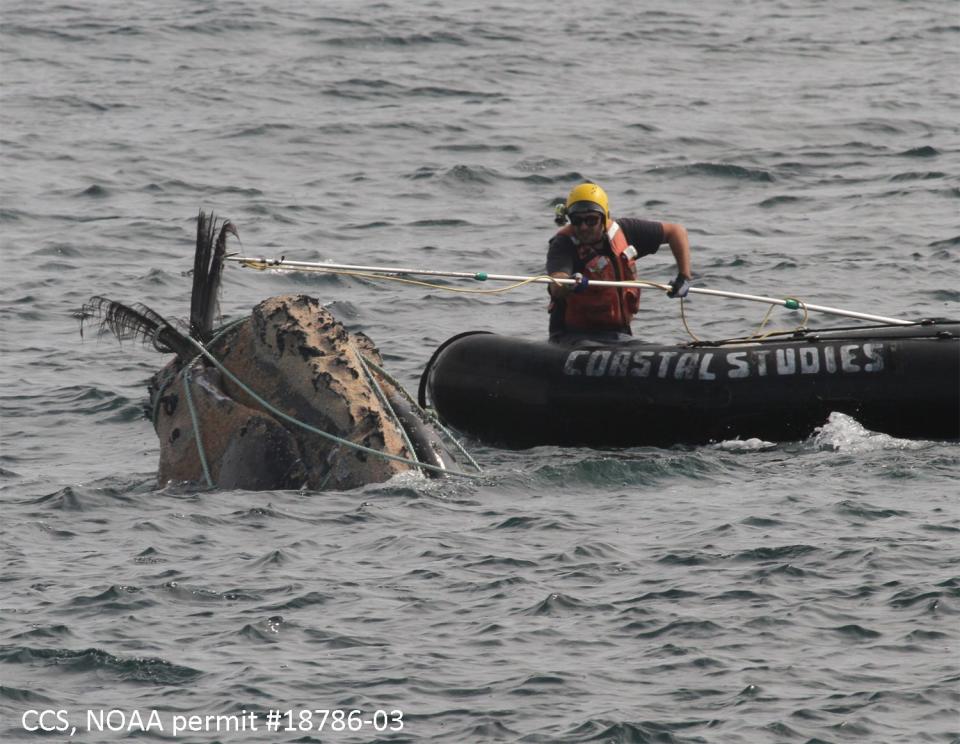Candis Whitney: Congress deals blow to endangered North Atlantic right whale

As we are in the midst of calving season for the critically endangered North Atlantic right whale, I can’t help but think of Snow Cone. Right whale 3560, nicknamed Snow Cone for her markings that resemble the summertime treat, is a right whale that I had the privilege of watching nurture and play with her baby calf off the coast of Florida just last spring.
Sadly, I am unlikely to see Snow Cone or her calf again. This past September, she was seen in extremely poor health, entangled in new fishing gear while still carrying gear from the previous entanglement. Numerous attempts to help disentangle her have failed.
Perhaps most tragic of all, her young calf, too young to survive without its mom, was nowhere to be found.
Rubio and Scott, et al:Senators from Florida, Carolinas call NOAA plan to save right whales 'costly,' 'excessive'
Gib Brogan:Right whale survival and boating not a zero-sum game
Snow Cone is not alone in her experience. During their migration from their winter calving grounds in Florida to their feeding grounds in New England and Canada, right whales must navigate dense commercial fishing areas. Too often, they become entangled in the vertical ropes that connect buoys on the surface to lobster and crab traps on the seafloor.
Once entangled in vertical buoy lines, whales swim with attached gear for long distances, ultimately resulting in fatigue, compromised feeding ability, or severe injuries that lead to reduced reproductive success and painful, protracted deaths.
Entanglements are the greatest threat to North Atlantic right whales and have affected nearly all the 340 that remain alive, with over half having been entangled multiple times. Nearly 2/3 of known right whale deaths and serious injuries in the past six years are due to fishing gear entanglements.
With just 70 reproductively active females left and the population having already declined by 30% in the last 10 years, the right whale is on the knife-edge of extinction-- entanglement is about to push them over that edge.

The situation is so dire, a federal court last year ordered the National Oceanic and Atmospheric Administration (NOAA) to craft new rules protecting the right whales from fishing entanglement by blocking off roped fishing where these whales are present.
However, Sen. Susan Collins of Maine, with the support of senators Angus King and Chuck Schumer (as well as Janet Mills, quietly worked to attach a rider within the Fiscal Year 2023 Omnibus spending bill, overruling the court order and delaying the Federal Government from enacting these rope fishing restrictions until Dec. 31, 2028.
Some experts are saying this last-minute policy change, if left in place, is the death-blow that will cause the right whale to go extinct. Their numbers are too few and they are reproducing too slowly to survive another six years of mothers dying while trying to rear calves.
Supporters of the Collins provision will say the bill could, in the long-run, be helpful because it authorizes $40 million over ten years towards expanding ropeless technologies. However, there is no guarantee these funds will be appropriated. This ‘authorization’ merely sets the money aside in case a future Congress decides to fund this proposal.
Blasting dangers:Seismic tests on Southern coastline could be stalled by expiring permits to hurt whales
Quinton White:Hot, then cold in Northeast Florida, how the fickle weather impacts marine life
Furthermore, ropeless technology doesn’t need 10 years of research to begin implementing. The technology exists today and is already commercially in use. Collins’ provision harms the good fishing companies while protecting and giving a market-advantage to those fisheries unwilling to do their part to prevent an entire whale species from going extinct.
Finally (and most importantly), six years of research will do nothing to save a species that is likely to become functionally extinct before that time. A six-year delay in rules preventing rope entanglement will likely lead to dozens more deaths, something these whales likely cannot withstand without going extinct.
In this calving season, 12 new whales have been born. This is exactly what these whales need to have a real fighting chance for survival. Unfortunately, as we’ve seen with Snow Cone, these calves and their mothers could die mere months from now due to entanglement. We are nearly out of time. The only way the North Atlantic right whale can survive is if we stop human-caused deaths today, not six years from now.
It is my hope that Congress will undo this extinction-causing rule that was quietly snuck into the Omnibus that Congress had to pass in December. I sincerely hope that future generations will have the opportunity to witness the beauty of the North Atlantic right whale, free from entanglements.

Candis Whitney is the former owner/operator of a 114-slip marina in Northeast Florida. A resident of Fernandina Beach, she currently serves as an organizer for the Amelia Island Conservation Network, the Right Whale Festival and board member for Wild Amelia.
This guest column is the opinion of the author and does not necessarily represent the views of the Times-Union. We welcome a diversity of opinions.
This article originally appeared on Florida Times-Union: New NOAA rules to protect right whales blocked by Congress

